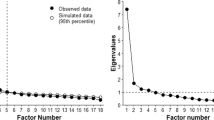Abstract
This study examined the USA-Spanish version of the SF-36 health survey (validated in Mexican- Americans) and tested its construct validity in Cuban-Americans with benign prostatic hyperplasia (BPH). The study evaluated the SF-36 and American Urological Association (AUA) Symptom Index scores of 264 individuals with BPH. Individuals were assigned to one of the following groups: non-Hispanics who received the English version, Cubans who received the English version and Cubans who received the Spanish version. The objective was to determine the correlation between the individuals' SF-36 and AUA Symptom Index scores. It was expected that patients in the severe category would have the lowest quality of life (QoL) scores. The analysis was conducted using a MANOVA with a planned comparisons procedure. For all eight scales, the English and Spanish versions of the SF-36 were able to classify individuals with mild/moderate symptoms of BPH as having statistically higher QoL scores than those with severe symptoms of BPH. We concluded that the USA-Spanish version of the SF-36 can differentiate between levels of symptom severity in individuals with BPH. More importantly the construct validity of the English and Spanish versions of the SF-36 was demonstrated through significant correlation with the theorized constructs.
Similar content being viewed by others
References
Marín G, Marín BV. Research with Hispanic Populations. Newbury Park, CA: Sage Publications Inc. 1991: 1-7.
Patrick DL, Sittampalam Y, Somerville SM, Carter WB, Bergner M. A cross-cultural comparison health status values. Am J Public Health 1985; 75(12): 1402.
Deyo RA. Pitfalls in measuring the health status of Mexican Americans: comparative validity of the English and Spanish Sickness Impact Profile. Am J Public Health 1984; 74: 569.
Chwalow AJ, Lurie A, Bean K et al. A French version of the Sickness Impact Profile (SIP): stages in the cross cultural validation of a generic quality of life scale. Fundamental Clin Pharmacol, 1992; 6: 319.
Aaronson NK, Acquadro C, Alonso J et al. International quality of life assessment (IQOLA). Qual Life Res 1992; 1: 349.
WHOQOL Group. Study protocol for the World Health Organization project to develop a quality of life assessment instrument (WHOQOL). Qual Life Res 1993; 2: 153.
Brorsson B, Ifver J, Hays RD. The Swedish Health-Related Quality of Life Survey (SWED-QUAL). Qual Life Res 1993; 2: 33.
Erdman RA, Passchier J, Kooijman M, Stronks DL. The Dutch version of the Nottingham Health Profile: investigation of psychometric aspects. Psychol Rep, 1993; 72(3): 1027.
Mathias SD, Fifer SK, Patrick DL. Rapid translation of quality of life measures for international clinical trials: avoiding errors in the minimalist approach. Qual Life Res, 1994; 3(6): 403-12.
Ware JE, Snow KK, Kosinski M, Gandek B. SF-36 Health Survey, Manual and Interpretation Guide. Boston, MA: The Health Institute, New England Medical Center, 1993.
Ware JE, Keller SD, Gandek B, Brazier JE, Sullivan M, IQOLA Group. Evaluating translations of health status questionnaires: methods from the IQOLA project. Int J Technol Assess Health Care 1995; 11: 525-551.
Ware JE, Gandek B, Keller SD, IQOLA Group. Evaluating instruments used cross-nationally: methods from the IQOLA project. In: Spilker B, ed. Quality of Life and Pharmacoeconomics in Clinical Trials, 2nd edn. Philadelphia: Lippincott-Raven Press, 1996: 681-692.
Barry MJ, Fowler FJ, O'Leary MP et al. Correlation of the American Urological Association Symptom Index with self-administered versions of the Madsen-Iversen, Boyarsky and Maine Medical Assessment Program symptom indexes. J Urol 1992; 148: 1558.
Barry MJ, Fowler FJ, O'Leary MP, et al. The American Urological Association Symptom Index for benign prostatic hyperplasia. J Urol 1992; 148: 1549.
Arocho R, Kason NM, Colón B, McMillan, CA. Translation and validation of the American Urological Association Symptom Index into Spanish. Clin Therapeut 1995; 17(4): 777-785.
Goodman LA. Snowball sampling. Ann Mathemat Stat, 1961; 32: 148.
Eri LM, Tveter KJ. ‘Measuring the quality of life of patients with benign prostatic hyperplasia.’ Eur Urol, 1992; 21: 257-262.
Fowler FJ, Barry MJ. ‘Quality of life assessment for evaluating benign prostatic hyperplasia treatments: an example of using a condition-specific index.’ Eur Urol 1993; 24(Suppl 1): 24-27.
Tsang KK, Garraway WM. ‘Impact of benign prostatic hyperplasia on general well-being of men.’ Prostate 1993; 23: 1-7.
McDowell I, Newell C. Measuring Health. A Guide to Rating Scales and Questionnaires. New York: Oxford University Press, 1987: 26-35.
Stewart AL, Hays RD, Ware JE Jr. Methods of validating MOS health measures. In: Stewart AL, Ware JE Jr, eds Measuring Functioning and Well-Being: The Medical Outcomes Study Approach. Durham, NC, Duke University Press, 1992: 309-324.
Stevens J. Applied Multivariate Statistics for the Social Sciences, 2nd edn. Hillsdale, NJ: Lawrence Erlbaum Associates Inc, 1992.
Keppel G. Design and Analysis: Researcher's Handbook. Englewood Cliffs, NJ: Prentice-Hall Inc, 1991.
Author information
Authors and Affiliations
Rights and permissions
About this article
Cite this article
Arocho, R., McMillan, C.A. & Sutton-Wallace, P. Construct validation of the USA-Spanish version of the SF-36 health survey in a Cuban-American population with benign prostatic hyperplasia. Qual Life Res 7, 121–126 (1998). https://doi.org/10.1023/A:1008801308886
Issue Date:
DOI: https://doi.org/10.1023/A:1008801308886



